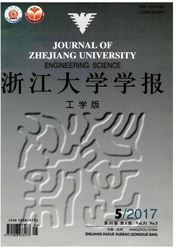

 中文摘要:
中文摘要:
当期望信号的波达方向存在不确定时,自适应波束成形器会遭受严重的性能衰减.提出了一种基于二次采样的贝叶斯波束成形算法,根据阵列接收数据计算出一组候选波达方向的后验概率,并根据此后验概率的分布来判断是否需要进行二次采样.对各候选波达方向上的波束成形权值矢量线性加权,得到基于二次采样的贝叶斯波束成形器,权系数是它们各自的后验概率值.仿真结果表明,当实际的波达方向在候选波达方向集合所覆盖的范围之外时,与典型的贝叶斯波束成形算法相比,该算法在性能上有着明显的优势.
 英文摘要:
英文摘要:
The adaptive beamformers often suffer severe performance degradation when there is a mismatch between the actual and presumed direction-of-arrival (DOA) of the desired signal. A Bayesian approach based on secondary sample to robust adaptive beamforming was proposed. Whether or not conducting the secondary sample is based on the distribution of the a posteriori probability of a set of candidate DOAs, which can be calculated from the received array signals. The resulting beamformer is a weighted sum of minimum variance distortionless response (MVDR) beamformers pointing at the latest set of DOAs, which are combined according to the value of the a posteriori probability for each pointing direction. Compared with the typical Bayesian approach to robust adaptive beamforming, the simulation on the case that the actual DOA is out of the region covered by the a priori DOA discrete set demonstrates that the proposed approach has obvious advantage in term of the array output signal to interference plus noise ratio (SINR).
 同期刊论文项目
同期刊论文项目
 同项目期刊论文
同项目期刊论文
 Building Environment Control with Wireless Sensor and Actuator Networks: Centralized vs. Distributed
Building Environment Control with Wireless Sensor and Actuator Networks: Centralized vs. Distributed 期刊信息
期刊信息
